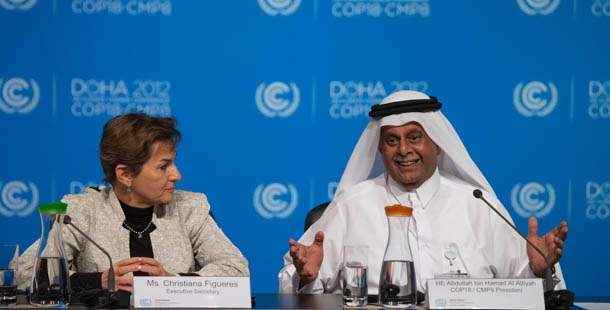The President of COP18/CMP8 has hailed the agreement reached after two-weeks of grueling negotiations as a “Gateway to the future”.
Abdullah bin Hamad Al-Attiyah said the final extra day of the UN Climate Change Conference had been historic as all parties had reached consensus despite complications and many hours of extra consultation.
The “Doha Climate Gateway” – as Mr. Al-Attiyah called the deal – marked the beginning of discussions on a universal, legally-binding international agreement on emission reductions, which should be ratified in 2015 and come into force in 2020.
Speaking with Mr Al-Attiyah at a press conference at the end of COP/CMP8, Christiana Figueres, the UNFCCC Executive Secretary, said what was needed now was greater “political will” by all governments.
“This was a historic COP,” she said and while she accepted that governments alone could not be expected to take solve the climate change crisis she said: “What needs to change now is political will.” She added: “We need the corporate sector to play a part and to contribute.”
The UN has endorsed a target of restricting global temperature rises to less than 2 degrees Celsius but Ms Figueres said “the window is closing in on us”.
She stressed that the world had the finance and the technical knowledge to tackle the issue but governments needed to take decisive action.
Ms Figueres said that the significance of the Doha agreement was that it was a bridge between the original Kyoto Protocol, which was drawn up in 1997 and expires at the end of this year, and the next protocol, which was agreed in principle in Durban (the Durban platform) last year and is due to be signed in 2015.
Asked whether it was realistic to feel optimistic when nations such as the United States, Canada and Japan were not part of KP, she said that was not a hindrance because there was now “100 per cent agreement” by nations on the need to cut emissions.
In Doha, she said, all countries had agreed to produce a document detailing their reduced carbon emissions six months in advance of the 2015 COP.
When Kyoto was drawn up the target was for carbon reduction of 5 per cent. In Doha the participating countries had raised that figure to 18 percent, she said. “Current pledges are clearly not enough to guarantee the temperature will stay below the 2 degrees increase,” she acknowledged, and went on to stress the importance of the Doha Gateway. It had “ensured environmental integrity and a robust accounting system. No country has said it will not take part, even if it has left the Kyoto Protocol.”
The President was asked about his handling of the Russian delegation whose leader complained at the final plenary session that his country’s concerns had not been given proper consideration. The Russian spokesman protested at Mr Al-Attiyah’s loud voice and use of the gavel to drive the conference through its final phases.
Mr Al-Attiyah was gracious in the press conference, saying he appreciated the point of “his friend” from Russia but stressed he had exercised extreme patience through the almost continual negotiations of the last 48 hours. “I did my best to respect countries with different views. “I was so patient. I gave them time and I waited hours for their consultations.”
In the end, he had to bring the conference to a conclusion in the interests of all the parties. “They support that decision,” he said. ‘I had to apply pressure to finish the conference. Everyone wanted to go home except me,” he said with a smile.
Ms Figueres said the request by the Russian delegation for changes was “very clear” but to have agreed them would have prevented an agreement being reached. She suggested that within the documents that made up the final Doha agreements the Russians would find what they were looking for and that their concerns had been answered.
“The Russian interests are faithfully reflected within the texts,” she said, adding that she did not expect the disagreement to result in “long term consequences”.
Ms Figueres also praised the conference for making a start in building up the Green Climate Fund, which will be used to help developing countries mitigate and adapt to climate change.
“Here in Doha countries have begun to make commitments totaling over $6 billion, mostly from European countries and the EU. We expect that funding will be bolstered by fresh pledges.”
ifpinfo
10 December



































































